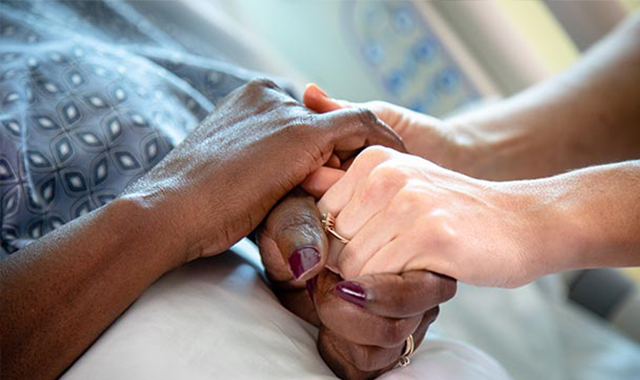Treatment Plans for Chronic Illness
Palliative Care is specialized medical care for people with serious, chronic illness. It focuses on providing patients with relief from symptoms and the stress of a serious illness - whatever the diagnosis.
Download Our FREE Palliative Care Brochure
Defining Palliative cARE
Palliative care (pronounced pal-lee-uh-tiv) is specialized medical care for people with serious, chronic illnesses. It focuses on providing patients with relief from the symptoms, pain, and stress of a serious illness—whatever the diagnosis. The goal is to improve quality of life for both the patient and the family.
Palliative care is provided by a team of doctors, nurses and other specialists who work together with a patient’s other doctors to provide an extra layer of support. It is appropriate at any age and at any stage in a serious illness. Unlike hospice care, it can be provided along with curative treatment.

Palliative Services
Palliative care is comprehensive treatment that focuses on the discomfort, pain, symptoms and stress of living with a chronic illness. Its goal is to prevent and ease suffering, and improve your quality of life. While hospice care is also palliative in nature, non-hospice palliative care is an option for those living with chronic illness but are not ready for hospice. Palliative care gives you a chance to live your life more comfortably.
It provides relief from distressing symptoms including shortness of breath, fatigue, constipation, nausea, pain, loss of appetite, problems with sleep and many others. Palliative care is available to you at any time during your illness, and you can receive palliative care at the same time you receive other treatments that are meant to cure your illness. Your Gulfside Palliative Care team will even work with you to help coordinate with your other healthcare providers.
Services provided by the Gulfside Palliative Care team include:
-
Provide assessment by a board-certified palliative physician and an experienced palliative care team
-
Provide quality-of-life improvements through various medical treatments
-
Provide support in decision-making and guidance to patients, physicians, nurses and family caregivers concerning treatment options, care planning and placement issues
-
Provide expertise in pain and symptom management
-
Offer emotional and spiritual support to patients and families
-
Consult with caregivers, medical and nursing staff on how to talk about palliative care with patients and families
-
Provide individualized care and resources for coping with denial, depression, loss and grief
-
Identify program eligibility and coordinate services for home care and equipment, Hospice, Medicaid, Medicare, VA benefits and other community resources
Palliative Care vs. Hospice: What’s the Difference?
Check out our blog to learn about the differences between hospice care and non-hospice palliative care, including treatment differences, timing, place of treatment, and differences in types of services.
Benefits of Palliative care
Pain and Symptom Control
The palliative care team will identify your sources of pain and discomfort. These may include problems with breathing, fatigue, depression, insomnia, or bowel or bladder. Then the team will provide treatments that can offer relief.
Communication and Coordination
The Gulfside Palliative Care team puts great importance on communication between you, your family and your doctors in order to ensure that your needs are fully met. These include establishing goals for your care, help with decision-making and coordination of care.
Emotional Support
Palliative care focuses on the entire person, not just the illness. The team members caring for you will address any social, psychological, emotional or spiritual needs you may have.
Family/Caregiver Support
Caregivers bear a great deal of stress too, so the palliative care team supports them as well. This focused attention helps ease some of the strain and can help you with your decision-making.
Frequently Asked Questions
-
Where is Palliative Care provided?
Palliative care services from Gulfside are currently available to you through our provider visits to hospitals. If you are interested in receiving our services, please discuss with your physician.
-
Can I receive curative treatment together with palliative care?
Absolutely. Your treatment choices are up to you. You can still benefit from getting palliative care at the same time as treatment meant to cure you.
-
Do I have to give up my own doctor?
No. The palliative care team provides an extra layer of support and works in partnership with your primary doctor. Your primary care physician will continue to direct your care and play an active role in your treatment with Gulfside.
-
Will my insurance cover palliative treatments?
Most insurance plans cover all or part of the palliative care treatments you receive, just as with other hospital and medical services. This is also true of Medicare and Medicaid. If costs concern you, a social worker or financial consultant from our team can help you with payment options.
-
How do I know if palliative care is right for me?
Palliative care may be right for you if you are experiencing serious symptoms due to a chronic illness, including but are not limited to:
- Cancer
- Cardiac disease
- Respiratory disease
- Kidney failure
- Alzheimer's disease
- AIDS
- Amyotrophic lateral sclerosis (ALS)
- Multiple sclerosis.
-
Who provides palliative care?
Each patient meets with the team ARNP. Additional services can be provided by nurses and social workers as directed by the plan of care.
When to start treatments
Palliative Care is an option during any stage of a chronic illness. The goal of palliative care is to improve symptoms, quality of life and patient satisfaction. At Gulfside Palliative Care, our focus is for you to live your life to the fullest with a healthcare plan tailored to your needs by our staff. The process starts with a one-on-one consultation that focuses on you and your life, not just your illness.
If you aren't sure, check out this list of signs that you or your loved one might be ready for palliative care:
-
Frequent ER visits or hospital admissions for the same condition
-
Chronic conditions or illnesses such as dementia, COPD, heart disease, etc. that are not yet terminal
-
Declining ability to complete activities of daily living
-
Weight loss
-
Chronic home oxygen use
-
Uncontrolled pain and symptoms
-
Patient is NOT terminal and does NOT qualify for hospice, however has a chronic or late stage illness that requires complex care and attention
-
Limited social and home resources and service support
-
Elderly, cognitively impaired and declining
-
Difficult to control physical or emotional symptoms related to illness
-
Patient and family uncertainty regarding prognosis
-
Patient, family or physician uncertainty regarding goals of care
READY TO LEARN MORE ABOUT GULFSIDE PALLIATIVE CARE?
We know that facing a chronic illness can raise plenty of questions and uncertainty. Our team is here to help every step of the way. Please feel free to contact us at any time, 24/7, or schedule a consultation to see how the palliative care services can help you.
Request an Evaluation for Care









